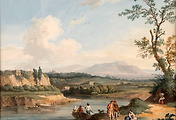






리처드 딕 사젠트(Richard Dick Sargent), 미국, 화가, 1911-1978
미국의 '리처드 딕 사젠트'는 고등학교를 졸업한 후 인쇄공장에서 일하면서 그림을 시작했습니다. 야간학교에서 미술수업을 받으며 일러스트 작업에 몰두한 결과, 광고 분야의 프리랜서로 일하게 되었죠.
이후 1951년 'Saturday Evening POST' 잡지의 표지에다 "산타의 진실"이라는 작품을 게재하면서부터 그는 본격적으로 이름을 알리기 시작했습니다. 다락방에서 산타클로스의 분장도구를 발견한 어린이의 그림이 큰 인기를 얻었죠.
가족들의 일상적인 장면들을 그린 그의 작품엔 항상 유머가 담겨있고, 장난꾸러기 아이들이 자주 등장한답니다. 1950년대 베이비붐 세대의 가정에서 볼 수 있는 여러 상황들을 재치 있게 묘사한 작품들입니다.
About Him
Richard “Dick” Sargent (1911-1978), one of The Saturday Evening Post’s most prolific illustrators, was a Midwesterner born in Moline, Illinois in 1911. His early career in art began just after his graduation from Moline High School, when he went to work for a local printing and engraving plant. While there, Sargent attended night classes at the Moline Illinois Art School, the foundation for his future career as an artist.
As his artistic prowess developed, he advanced further into creating professional artwork for advertising firms and later, a solo career as an artist and illustrator. The artist worked in advertising for over 20 years, starting in 1928, prior to making a name for himself as a freelance illustrator. During this time period, Sargent further honed his artistic skills by taking classes at both the Corcoran School of Art and the Phillips Memorial Gallery in Washington, D.C.
By the time Sargent headed out into the world to make a name for himself as a solo artist, he had started a family. They later provided inspiration for some of his most successful works of art. He married his sweetheart, Helen, and had a rambunctious, mischief-prone redheaded son named Anthony who was often depicted on the cover of The Post. The suburban life they built together established the perfect model for scenes of 1950s Baby Boomer households in everyday situations of suburban American life.
In 1951, Sargent completed his first Saturday Evening Post cover, “Truth About Santa”, for the December 15th Christmas issue. While Sargent’s popularity grew through The Saturday Evening Post, he also received illustration work from magazines such as Fortune, Woman’s Day, Photoplay, and American Magazine. Americans adored Sargent and his art for the ability to show a pregnant scene with an open-ended conclusion that commented on the situational comedy of life.
In addition to his work as a magazine illustrator, Sargent also received special commissions that afforded him the opportunity to travel the world. In 1954, the USO sent Sargent to Korea to entertain troops fighting in the Korean conflict. He later remarked, “We’d put on civilian clothes to work in- the boys would get such a kick out of seeing somebody in good old stateside civvies.” He spent six weeks flying throughout the country where he met with American soldiers and created art for them to send home to loved ones.
Sargent caught the “travel bug” on his trip to Korea and again vacationed out of the North American continent to Paris, France in 1959. He used his wife as a model in many works he created there to highlight Parisian life and landmarks. By the 1960s, photography had taken the place of illustration in magazine cover art. This caused the couple to move to the Andalusia region of Spain to live out the rest of their days in peaceful retirement. Sargent died suddenly in 1978 at the age of 67.
잉가 에두(Inga Edu), 루마니아, 화가, 1978-현재
잉가 에두(Inga Edu), 루마니아, 화가, 1978-현재이젤 페인팅, 유화, 파스텔 기법으로 작업. 아름다운 자연으로 가득 찬 그림으로 세상을 바꿀 수 있다고 믿는 예술가. Inga의 예술은 주로 우리를 둘러
mkpark03.tistory.com
야콥 필립 하케르트(Jacob Philipp Hackert), 독일, 화가, 1737-1807
야콥 필립 하케르트(Jacob Philipp Hackert), 독일, 화가, 1737-1807독일 브란덴부르크에서 태어난 '야콥 필립 하케르트'는 주로 이탈리아에서 활동한 풍경화가로, 무척 고전적인 스타일로 이탈리아 곳곳
mkpark03.tistory.com
모나 발린(Mona Huss Walin), 스웨덴, 화가, 1944-현재
모나 발린(Mona Huss Walin), 스웨덴, 화가, 1944-현재'모나 발린'은 스웨덴 스톡홀름에서 유화와 수채화 같은 페인팅 외에 석판인쇄 작업을 주로 해온 예술가입니다. 그녀는 무겁고 매끄러운 돌멩이
mkpark03.tistory.com
'생활 > 예술' 카테고리의 다른 글
| 에밀 클라우스(Emile Claus), 벨기에, 화가, 1849-1924 (3) | 2024.10.02 |
|---|---|
| 넬루 존(Neloo John, Nelu), 런던, 사진작가, 디지털 크리에이터, 현재 (0) | 2024.10.01 |
| 잉가 에두(Inga Edu), 루마니아, 화가, 1978-현재 (0) | 2024.09.29 |
| 야콥 필립 하케르트(Jacob Philipp Hackert), 독일, 화가, 1737-1807 (1) | 2024.09.27 |
| 모나 발린(Mona Huss Walin), 스웨덴, 화가, 1944-현재 (3) | 2024.09.27 |




댓글